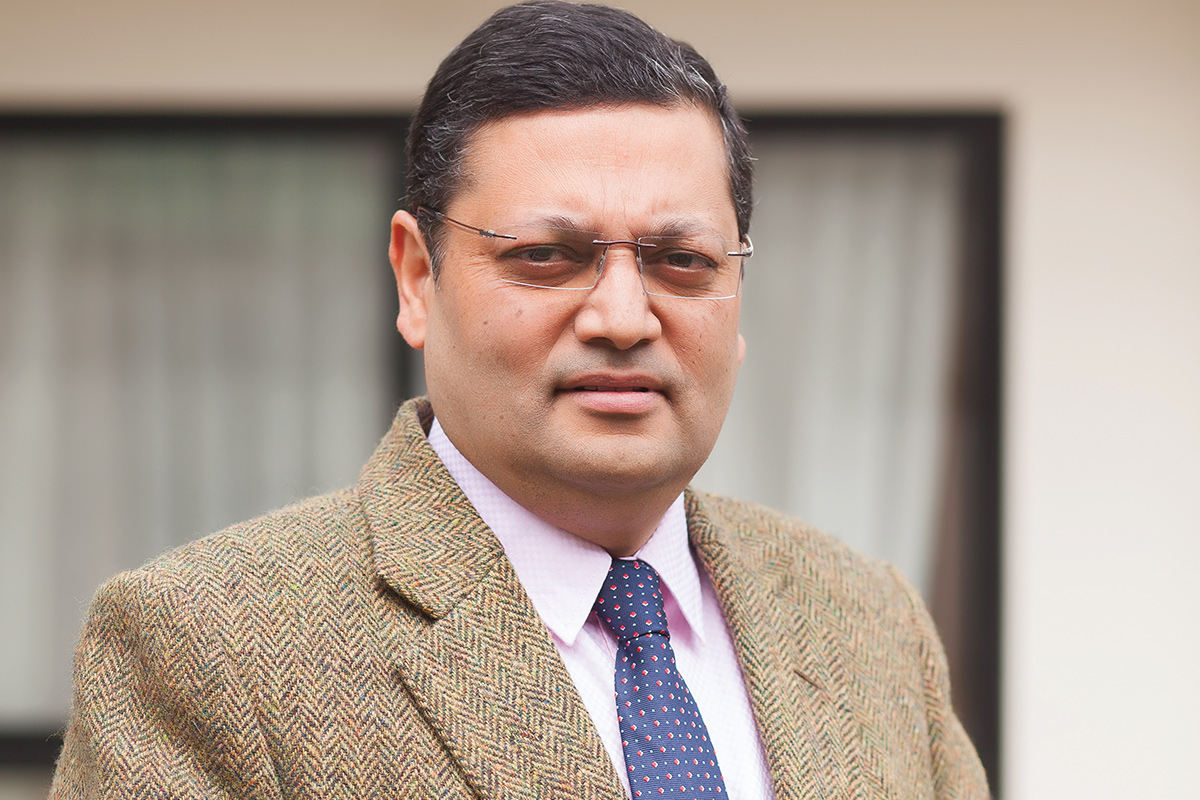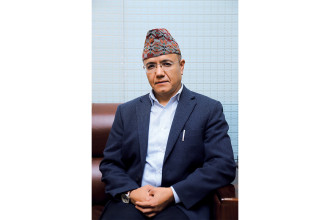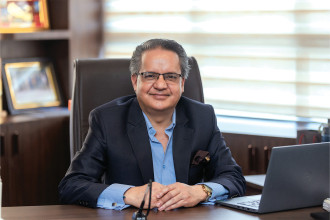
Dr. Nishchal Nath Pandey is the Chairperson of South Asia Foundation (SAF) Nepal. He is also the Director of Centre for South Asian Studies at Kathmandu; International Research Committee Member of the Regional Centre for Strategic Studies (RCSS), Colombo; teaches at the Department of Peace, Conflict and Development, Tribhuvan University and at the Nepal Army Command and Staff College.
He was formerly Executive Director, Deputy Executive Director and Research and Documentation Officer of the Kathmandu based Institute of Foreign Affairs where he worked for from 1998-2006. Dr. Pandey was also advisor to the National Planning Commission taskforce to draft the ninth five-year plan of the Nepal government. He has authored over three dozen research papers and articles to internationally reputed journals, books and periodicals, and was sub-editor of The Rising Nepal daily.
Dibesh Dangol of B360 interviewed Dr. Pandey to learn about his views on leadership. Excerpts:
How do you define leadership?
Leadership is taking the crowd along not following the crowd. A good leader has a vision for the future, good intention and does not get carried away by short-term interests of his subordinates.
What is the organisational structure of SAF Nepal?
I am the Director of the Centre for South Asian Studies (CSAS), an independent think-tank and we organise track-II seminars on regional cooperation in South Asia. We also bring out publications; some of which have been enlisted in university curriculum. Recently, the University of Pennsylvania Global Go To Think-Tank Ranking listed the CSAS as one of the top think-tanks in the Asia Pacific Region. When we do events, we try and include experts of the field rather than hire staff on a permanent basis. This is the new global trend. A permanent employee over time becomes lazy therefore short-term researchers who are experts on certain subjects can do justice to work.
How do you conduct your work as the Chairperson at SAF Nepal?
SAF-Nepal is a voluntary organisation, NGO, an apex body of SAARC and it provides SAF Madanjeet scholarships on subjects like international relations, media, engineering, green energy technology, fine art, forestry and development studies in universities in India, Pakistan, Nepal, Sri Lanka and Bhutan. We have many SAF-Nepal alumni in diverse fields working for the good of the society. I serve as Chairperson of SAF-Nepal.
In addition, I was visiting research fellow at the Institute of South Asian Studies (ISAS) at the National University of Singapore and also at the Stiftung Wissenscahft und Politik (SWP) in Berlin. I also teach at several places mainly on international relations. I am regular faculty of the Armed Police Force Command and Staff College.
How can a leader fail? Can you give us an example?
There are several examples of leaders failing in world history. One person was Hitler who brought misery to thousands and ruined the lives of millions, another was Stalin. We should never count how many followers a leader has rather what good s/he has done for the country or even the region.
Where do you think Nepal is headed to with the current leadership? What are some of the strengths and weaknesses of the current leadership?
After prolonged political instability, our country has entered a phase of stability but the people need to experience this. Only rhetoric bereft of substance is not going to help. We have already had five constitutions in the last six decades and 19 Prime Ministers in 20 years. Now that all three layers of the state have gone through elections under a new constitution, the Nepalis together with the international community expect good governance. They also expect a serious clampdown of corruption at high places. This is where leadership counts. Dithering away from corruption control and paying lip-service to governance will not make this regime any different.
I do not want to go very far. But an example of where leadership is clamping down on corruption - whether it in the politics, civil service, police or the army - is in our neighbouring country China. Under President Xi’s leadership, China is trying to cleanse its internal organs so that it can be agile and steadfast to compete outside. It is also a communist party. I hope our top leadership takes a lesson or two.
What are the attributes of a good diplomat?
An old saying goes, ‘a good diplomat is he who has the full trust of the country that sends him and the country that receives him’. I hope this is learnt by our decision makers when making appointments. Loyalty to the nation should not be minimised while searching for loyals to the party. These days the contours of diplomacy has radically changed. Some countries do not even see the need to open expensive embassies and staff them with a bulky manpower. Singapore for instance does not have an embassy in Pakistan. Former Secretary General of ASEAN Ong Keng Yong who is now at the Nangyang Technological University (NTU) is non-residential ambassador to Pakistan and he told me that he flies regularly, gets jobs done and returns back to Singapore.
A leader who inspires you?
A leadership that inspires me is Late Konrad Adenauer, the first Chancellor of Germany after the Second World War. By reaching out to France, he planted the seeds for European integration which today is one of the most remarkable achievements of mankind. People travel, work and reside in each other’s countries with a single visa, single currency and a common security policy. This should be the vision in South Asia. We need someone like Konrad Adenauer.
A book on leadership you recommend?
I suggest to the Nepali youngsters to read ‘Kutniti ra Raajniti’ and polish their Nepali language a bit. It’s a memoir of my father, Ramesh Nath Pandey, former minister. It has been re-printed thrice after getting published three years ago. More than this, what is extraordinary of the book is that it shows how difficult it was to safeguard Nepal’s sovereignty and territorial integrity which has been remarkably achieved by successive leaderships under different regimes in Nepal. The new generation needs to be aware of this reality. They should not take their country’s prestige lightly. We were sovereign even at a time when the rest of South Asia was under colonial rule.
What are some of the things you do to develop yourself personally and professionally?
Every three years, I manage to get one or the other visiting research fellowships at some of the top universities or think-tanks in the world. I have been visiting fellow at Institute of South Asian Studies at the National University of Singapore, at the SWP a leading think-tank in Berlin and I also go to Pondicherry University every year. This refreshes me. I talk to the young students and get to know their newer perceptions about the state and society.
In your professional capacities, you deal and interact with the youths of the country. What type of drive and leadership qualities do you see in them?
I interact with the young people all the time, during the course of interviews or during classes. They have the zeal to transform our society and take it to the league of developed nations. They are proud of our glorious history. Nepal was never colonized in its entire history, Nepali youngsters are proud of this heritage.




-(1)-1752214965.jpg)